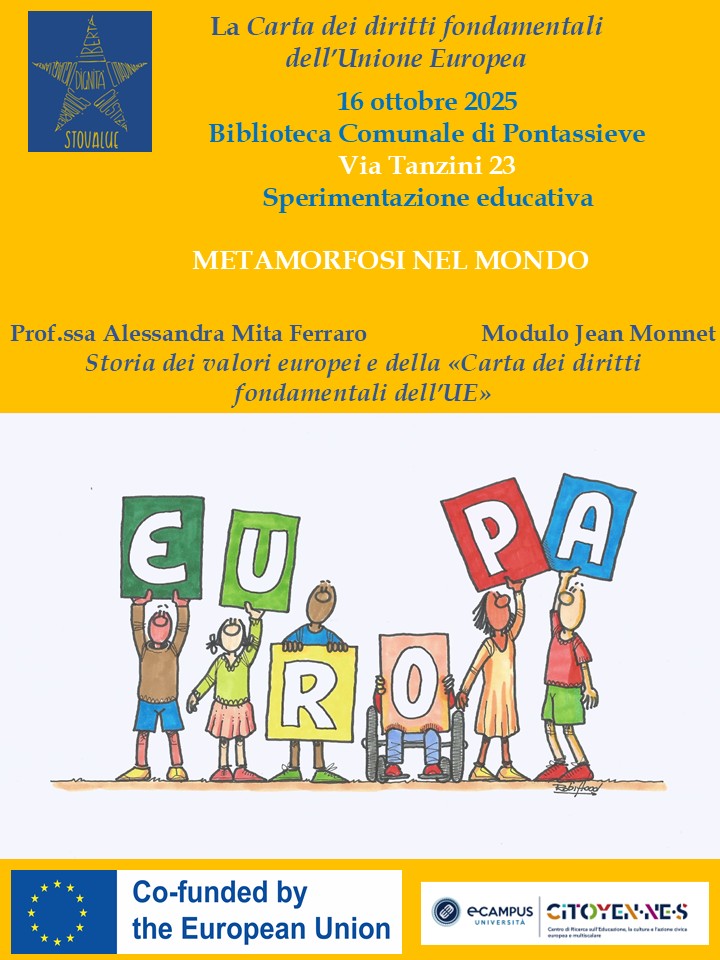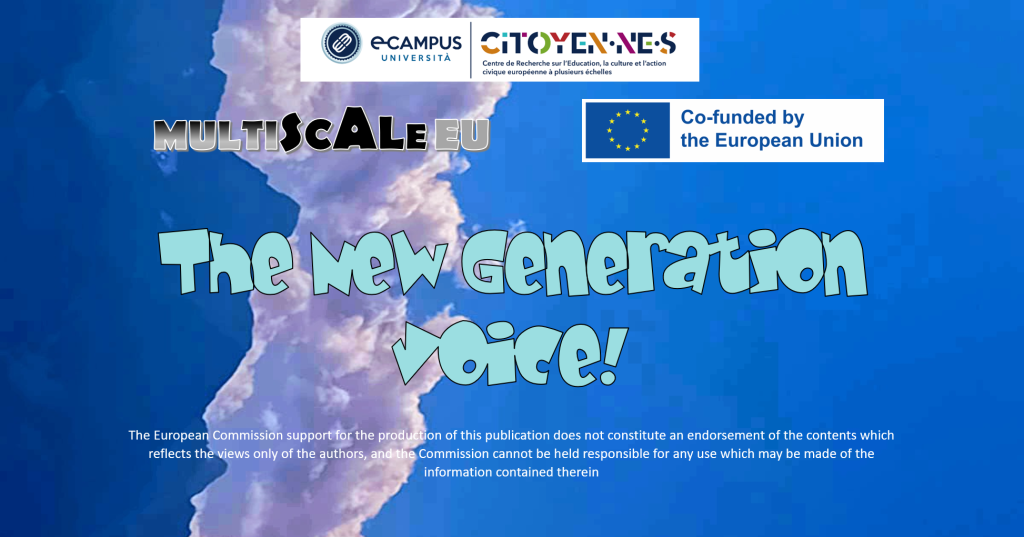All posts by editor
From Economy of Occupation to Economy of Genocide
Francesca Albanese’s report as the UN Special rapporteur on the situation of human rights in the Palestinian territories occupied since 1967 is a must-read for a better understanding of today civic challenges at different levels. We relaunch it here, also as a form of solidarity since she has been personally attacked to move public attention from the very contents of her (thoroughly detailed) work.
Jean Monnet Module StoValUE: an interdisciplinary seminar in the PhD course on Medium and Mediality
The New Generation Voice! Our weekly columns on eCampus webzine
The Multiscale EU project ended on 9 January this year, but many of its activities still continue to further develop and spread its results and outputs, as well as the overall action research framework on a multiscale critical pedagogy for citizenship in the European Education Area that this Jean Monnet Teacher Training project belonged to.
One of the initiatives our Research Centre already confirmed and planned on a long-term perspective is the publication of weekly columns for eCampus academic community, particularly prospective and in-service teachers at all school levels, and the general Italian-speaking public. You can find us under the title “The New Generation Voice” (read here why and in what sense).
Read us by clicking on the cover below.
A multiscale Citizenship Education Policy for the European Education Area
We publish in this page of our website the Policy brief focused on citizenship education proposals at the European Union level we presented last 9 November in Paris. This initiative is part of Multiscale EU working programme.
Multiscale EU Academic Seminar 2 – Monika Pažur on Teacher Training in Citizenship Education
Multiscale EU in Romania (Pitești and Câmpulung)
We are really pleased to announce that from 21 to 23 November Francesco Pigozzo and Daniela Martinelli have been invited to realize in-presence three different initiatives belonging to the Jean Monnet Teacher Training project “Multiscale EU” they coordinate: the Academic seminar, hosted by the Bucharest University in Pitești, and two cultural events featuring “Europe : quelle Passion ! / Europe : what a Passion !” music recital show.
The local channel Muscel TV provided information about the event in Câmpulung (you can read the article here):
You can read here the Romanian leaflets.
We warmly thanks all the Roumanian teachers who took this initiative and Andreea Savescu in particular for her tireless commitment that allowed it to become real.
Multiscale EU on eTwinning platform: transformative practices for citizenship pedagogy
A dissemination event hosted by the eTwinning platform and devoted to our Jean Monnet Teacher Training project and its many results and outputs for the European Education Area. We warmly thank Glyki Gkouvatsou, moderator of the eTwinning featured group GBC (Game Based Classroom) and former participant of our Multiscale EU winter school in 2023, who took the initiative to organize this webinar!
The event will take place on 18 November 2024, from 5 to 6 p.m. (Central European Time), online.
Subscribe to take part to the free online event here: https://events.teams.microsoft.com/event/6966000b-39c5-40c9-9643-ff2657670720@e21d18f1-2112-4ecf-a67c-d20aedbd18b3
Multiscale EU Policy Brief presentation – citizenship education for the EEA
We publish here the programme of a joint event we organized with AEDE France, next Saturday, 9 November 2024, in Paris. We’ll present the new Policy Brief prepared in the framework of the Jean Monnet Teacher Training project Multiscale EU.
Multiscale EU Academic seminar: call for papers
What is the knowledge and what are the abilities teachers need to increase, whatever their school level and subject matter taught, in order to upscale and to enhance their personal contribution to grow up democratic citizens?
How to more effectively train teachers who want to maximize their educational results in terms of critical and democratic citizenship empowerment?
These fundamental questions lay behind the “Multiscale EU” research and action, co-funded by the European Union as a Jean Monnet Teachers’ Training project. But they also nourish, and will continue to, a long-term scientific and ethical commitment whose scope goes well beyond specific project frameworks and aims at revitalizing critical pedagogical approaches.
Our many-folded experiences over the last 20 years, with tens of thousands of pupils/students and with thousands of teachers/school directors from many EU countries, allow (and, in a way, compel) us to advance at least part of the possible answers to those questions. Yet we are convinced answers to collective issues must always be co-developed by those who find they agree on the very existence and the definition of what the issues are, and share a similar impulsion to tackle them.
This is why we publish here a call for paper and participation to a European academic seminar focused on the questions above, that will take place online – via a GoToMeeting room – the next November 30, 2024. We promote this initiative in the framework of the “Multiscale EU” project.
We invite Faculty members in Pedagogy and Education departments, scholars, researchers, doctoral and post-doctoral fellows but also educational actors across all levels and fields to join and enrich the discussion about one or both of the specific topics we drew from our framework research questions, namely:
1. A cross-national training progamme for European teachers in citizenship pedagogy from a critical democratic perspective. Contributions may (for example, but not exclusively) deal with: reporting or reflecting on field experiences already carried out or in progress, prospective vs in-service teachers needs, curriculum design and learning objectives, didactic methodologies, trans-national hurdles and opportunities in inter-university cooperation, nationally specific vs European requirements…
2. Implicit curriculum: insights for a democratic citizenship education. We welcome both theoretical and empirical, normative and descriptive contributions on inconsistencies and structural hurdles (at whatever level and in whatever field) European teachers should be aware of because they have an impact on actual school practicies and behaviours.
The seminar schedule is divided into a morning and an afternoon session, focused on the two topics respectively.
Prospective contributors are asked to submit an abstract of around 300 words as well as a short bio to citoyennes@uniecampus.it by November 10, 2024 – all EU official languages are allowed.
Presentation and discussion of individual contributions during the seminar will need to be either in English or in French, followed by the publication of an edited collection in the same languages. The deadline for final paper submission is December 10, 2024: papers should be around 5000-7000 words.


